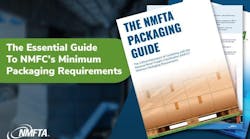Diets of many truck drivers are killers. Truckers, like most Americans, pick a hamburger, fries and the like as their food of choice when eating out. But drivers have the occupational hazard of “staying seated” longer, which makes for a more sedentary lifestyle than most other lines of work. As a result, drivers often end up “wearing” more of what they eat. They also have more disease and shorter life spans.
Drivers get scrutinized more every day. Blood pressure, screening for controlled-substance intake, sleep patterns, hours-of-service, style of driving, fuel economy practices, safe driving performance, and fatigue potential are all part of government regulations or company-directed oversight. But almost no one pays much attention to the “fuel” used by the driver, including the driver himself.
It's time we did.
Perhaps the most depressing statistic is that the life expectancy of over-the-road male drivers is 15 years less than that of males in other professions. This is no doubt correlated with high-calorie, high-fat diets, excess weight, and little or no exercise.
“There is a quiet, almost invisible epidemic plaguing America's truckers,” says Pam Whitfield, an Emmy Award-winning television producer and registered dietician. Whitfield and her husband, Don Jacobson, have a show called Road Cookin' that airs as part of Sirius Satellite Radio's “Open Road Cafe” with Mark Willis on Sirius 138, Fridays at 8 a.m. Central Time.
“Many drivers not only eat unhealthy food, but a surprisingly large number say they only eat one big meal a day, which usually ends up being a ‘whopper’ in terms of high calories and fat. That's tough on the body,” says Whitfield. “And their choices can be limited by parking restrictions at supermarkets and very few healthy options on truck stop menus.
Through their radio program and web site, www.roadcookin.com, Whitfield and Jacobson are working to build a radio-networked community dedicated to helping truckers eat smart. Whitfield believes that drivers would make better food choices if there were more healthy-food options at truck stops, and if they had access to a network of like-minded drivers seeking a lifestyle change.
At the same time, she realizes that restaurant trends are tilting in the opposite direction. A national restaurant chain recently announced it was canceling its “smart food” menu choices and will be promoting its biggest burgers instead. Sales rose nicely on the big ones, apparently. And one of the largest fast food chains in the world reports that in the U.S., only about 2% of its customers purchase salads.
Whitfield knows that pitching healthy food to drivers is a steep grade, but she thinks information and networking are key incentives to change, especially if the goal is to change a little at a time. “It takes time to decide to change and even longer to lose weight. Weight loss should be slow and steady, with a meal plan that's healthy and appealing, she explains. “Cutting back on portion sizes, switching from soda pop to water, or snacking on fruit instead of a candy bar can make big differences. Add to that the support of drivers trying to do the same thing and who knows where we can go?”
“The stakes are pretty high for the trucking industry in the long haul,” Whitfield adds. “Better nutrition for drivers not only adds more years to the life, but more life to the years.”
Gary Petty is President and CEO of the National Private Truck Council.The council's web site is www.nptc.org. His column appears monthly in FLEET OWNER.


